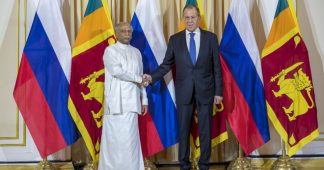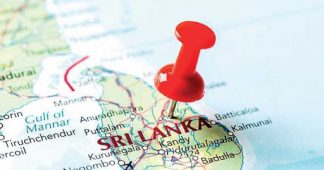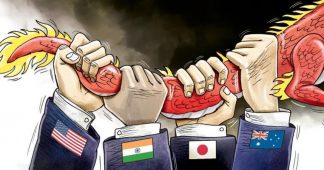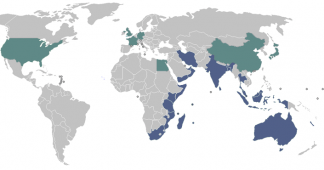By Lasanda Kurukulasuriya
With the Indian Ocean increasingly becoming a locus of big power contestation, the recent two-day visit to Sri Lanka by Chinese Defence Minister General Wei Fenghe has implications, not only for the growing bilateral relationship between the two countries, but the changing dynamics of the external environment against which the visit takes place.
A notable aspect of the remarks made by the top Chinese official was the reference to strengthening military to military relations. China came to Sri Lanka’s aid during the war against the LTTE, when it supplied military hardware at a time the West refused it. But it is peace-time now, and the reference would relate to security in a more general sense and in the longer term. During his meeting with Prime Minister Mahinda Rajapaksa on April 28 Wei said (as translated):
“I believe my visit will strengthen bilateral and mil to mil relations. …. Our two militaries have carried out fruitful cooperation in different fields. This morning we had a very cordial and candid discussion with the president and defence secretary. We informed that we would provide another RMB 50 million military assistance to the Sri Lankan side. We also witnessed signing of military protocol to the total amount of RMB 102 military aid, in year 2017 and 2019. We had a further in-depth exchange of ideas to further our military cooperation, in this morning. We are ready to work together with Sri Lanka to deepen our military cooperation to carry forward friendship and to bring our mil-to-mil relations to a higher level.”
The significance of the RMB 50 million grant, though relatively small in monetary terms, would lie in the gesture of offering military assistance. A specific military focus was not evident in previous recent visits by high-ranking diplomats from Beijing.
China and the Quad
Apart from foreign investment, poverty alleviation and vaccine diplomacy, Wei’s talks with the President and Prime Minister had significant assurances of mutual support in international fora. According to Xinhua, Wei said China “will as always support Sri Lanka’s stance over issues relating to human rights and national reconciliation.” His reference clearly was to the UNHRC’s March session where a damning Western-led resolution against Sri Lanka was adopted. According to Xinhua, President Gotabaya Rajapaksa said that “Sri Lanka has prioritized developing the relations with China and firmly supported China’s positions on issues concerning its core interests.” Rajapaksa had asserted that “his country has been pursuing an independent foreign policy and will never bend to pressure from major powers outside the region as well as never forge an alliance with any country.” (‘Sri Lanka, China vow to enhance pragmatic cooperation in all sectors’ – Xinhua 28.04.21)
During Wei’s meeting with Prime Minister Mahinda Rajapaksa, Xinhua reports that Wei stressed the need for ‘peaceful development,’ saying that “certain major countries are keen to form cliques and factions and seek regional hegemony, which goes against people’s shared aspiration and severely harms the interests of the regional countries.” He refers to the recent galvanisation of the ‘Quad’ (quadrilateral security dialogue) – a group comprising US, India, Japan and Australia, increasingly seen as a military alliance, with a common goal of pushing back against China’s rising influence.
Wei arrived in Sri Lanka from Bangladesh, where he is said to have made pointed reference to the Quad. Dhaka-based Prothom Alo reported foreign ministry officials saying that Wei called on president Md Abdul Hamid and “apprised him of Beijing’s displeasure with QUAD,” and that “He also expressed China’s hope that the two countries could work together against QUAD spreading its dominance in the region.” The report said the Chinese minister commented that “an anti-China coalition was being formed in the name of a free and open Indo-Pacific region.” Bangladesh’s Foreign Secretary Masud Bin Momen was reported saying that while Wei expressed China’s stand on the matter, “that does not mean that Bangladesh supports what he said.”
It appears Bangladesh walks a similar diplomatic tightrope as Sri Lanka, in balancing its relations with China and India. While the India relationship is critical, at the same time Bangladesh has ‘extensive defence cooperation with China’ and remains the army’s main source for weapons procurement, according to Prothom Alo.
War games in the Indian Ocean
In March-April the waters of the Indian Ocean were bristling with warships engaged in military exercises, many of them representing extra-territorial powers. From 28th to 29th March the Indian and US navies carried out a naval exercise in the Eastern Indian Ocean region. From 5th to 7th April a French-led mega naval drill called ‘La Perouse’ saw the participation of India along with its Quad partners US, Japan and Australia in the Bay of Bengal. It followed the first (virtual) summit of Quad leaders in March, where the Biden administration had affirmed the importance of the ‘Indo-Pacific’ in US foreign policy. Indian Navy Spokesman Commander Vivek Madhwal signaled that India was onboard with US strategy when, according to PTI, he said that India’s participation in ‘La Perouse’ “demonstrates the shared values with friendly navies ensuring freedom of seas and commitment to an open, inclusive Indo-Pacific and a rules-based international order.” From 25th to 27th April the French and Indian Navies participated in another joint naval exercise called ‘Varuna 2021’ in the Arabian Sea. A notable development is the growing interest of European powers in the Indian Ocean.
Yet the cohesiveness of these newly active anti-China formations is by no means clear. The US call for a ‘rules based international order’ is riven with contradictions stemming from the US’s own conduct. Just days after the conclusion of ‘La Perouse,’ a warship of the US Seventh Fleet transited through India’s exclusive economic zone without India’s consent, in what the US termed a ‘Freedom of Navigation’ operation. This sparked a diplomatic spat between Washington and its new best friend, Delhi, with the latter conveying its concerns through diplomatic channels. The ‘rules based international order’ that the US seeks, refers to rules designed to protect its own hegemony, it would seem.
Analysts say US economic interests are tied to China in a way that makes an all-out confrontation untenable. “The fact is that, unlike the original Cold War where there were nearly no economic relations between the US and USSR, the economic ties between the US and China are deeply intertwined to the former’s disadvantage’ writes Jean Pierre Page. “For instance, deindustrialisation has proceeded in the US thanks to US corporations outsourcing manufacturing to China. This makes any decoupling almost impossible.” (‘The Longer Telegram and ‘sleepy Joe’ in Wonderland’ – New Cold War, 30.04.21)
Against this backdrop of ambiguity, a NATO report last year called on its members to deepen cooperation with their ‘Indo Pacific’ partners, suggesting engagement with the Quad, in order to counter China. It even suggested a partnership with India. With militarization of the Indian Ocean already underway, the expansion of NATO’s focus (traditionally Europe and Russia) to include China and the Asia-Pacific is a cause for concern, if not alarm – not only for littoral states like Sri Lanka but for the wider region and beyond. US Secretary of State Antony Blinken addressing NATO members in Brussels in March, identified China as a ‘economic and security threat’ to NATO member countries.
It is against this changing geopolitical landscape that China’s recent South Asian diplomacy needs to be viewed. The Asian giant’s rhetoric has so far stressed that it does not want conflict with anyone, that it seeks peace and stability. Could mounting pressures catalyse a change in approach? If China’s offer of military assistance to Sri Lanka moves towards alliance with Beijing, this could play out as a self-fulfilling prophecy for the Sino-phobic West.











